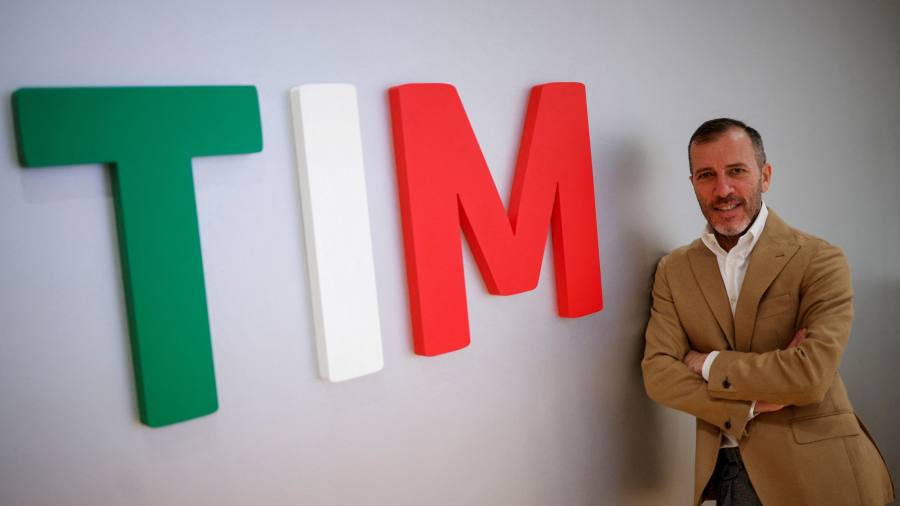Receive free Telecom Italia SpA updates
We’ll send you a myFT Daily Digest email rounding up the latest Telecom Italia SpA news every morning.
Vivendi, the French media group backed by billionaire Vincent Bolloré, plans to fight a proposal by Telecom Italia to sell its prized landline network to KKR, according to people with knowledge of the situation.
The Telecom Italia (TIM) board is expected to back the opening of exclusive negotiations with KKR on Thursday, said the people, opening a new chapter in a long-running battle over the heavily indebted mobile and broadband group’s future.
Vivendi, which holds a 23.75 per cent stake in TIM and more than 17 per cent of its voting rights, believes that the private equity firm’s offer undervalues the network and that any sale would be a strategic mistake. “Separating the network without solving the problem of what’s next for Telecom Italia is just procrastination . . . and deficient governance and management,” said one of the people.
Vivendi, which is controlled by Bolloré, has “been fighting this battle because the asset that is the jewel of the company is the network. So if you separate the network from the rest of the company it’s a dead man walking,” the person added.
KKR’s offer values the network at about €22.5bn, but Vivendi argues it is worth more than €30bn.
“As any shareholder, we say that we want to make sure that the board takes into consideration how to maximise the value for all the stakeholders, including the shareholders,” Yannick Bolloré, chair of Vivendi’s supervisory board, said in an interview with the Financial Times on Tuesday. He declined to comment further on any asset sales.
TIM declined to comment.
The fixed-line network’s valuation has long been a sticking point between the parties, including Italian state investor Cassa Depositi e Prestiti (CDP), which is already an investor in TIM. It has also submitted a competing joint bid with Australian fund Macquarie that values the network at under €20bn.
Vivendi has invested more than €4bn in building its stake in TIM since 2015, billing it initially as a strategy to create a media champion in southern Europe. However, it has had to write down its investment twice as the Italian company’s valuation plunged amid high debt, increased domestic competition, lower margins and multiple management overhauls.
TIM’s stock now trades at €0.20, but when Vivendi first invested in the group eight years ago the shares were worth more than €1 each. They were down 4 per cent in lunchtime trading in Milan on Thursday.
Vivendi at present has no board representation after its chief executive Arnaud de Puyfontaine announced his resignation from TIM’s board in January.
KKR’s offer is expected to trump the competing one by CDP and Macquarie as they are also investors in Open Fiber, a domestic competitor, which poses antitrust concerns.
The mooted sale is part of chief executive Pietro Labriola’s attempt to relaunch the debt-laden group, but his plan has run into opposition from Vivendi, which appointed him in late 2021.
The current disagreement is the latest in a string of clashes between TIM and its main shareholder. Former chief executive Luigi Gubitosi left the company after grappling with Vivendi over KKR’s first €33bn bid, which he supported and which envisaged taking the company private.
People close to the talks in Rome said the US group is well placed to turn the company around. It would also allow the company to slash its €25bn pile of debt and improve its valuation. Italian infrastructure fund F2i is also likely to take a minority stake if talks with KKR move forward, according to people close to TIM and the Italian government.
Italian officials said Vivendi’s “tacitly obstructive opposition” to the deal had “profoundly” irritated Rome, which did not believe the French group had a viable alternative solution. “It’s either this or a capital increase. It’s understandable they don’t want to lose money on their investment, but this behaviour is rather childish because the alternatives to KKR — CDP and Macquarie — don’t look very good at all,” said a senior Italian official.
Under Italy’s so-called “golden power” rules, the government can intervene to block or facilitate investments by foreigners in assets deemed strategic for the country. Telecommunications networks are one of the sectors over which Rome has the broadest oversight.
Last week, Prime Minister Giorgia Meloni’s cabinet approved measures to curb Chinese group Sinochem’s influence over tyremaker Pirelli, whose technology was deemed strategically relevant for national security.
Read the full article here




